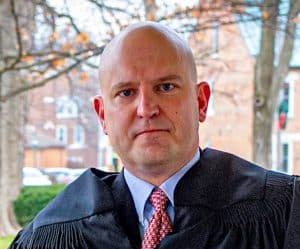Judge Hitzemann begins term

After serving as Monroe County State’s Attorney for four years, Chris Hitzemann is just over three weeks into his first term as the county’s judge on the 20th Judicial Circuit Court.
Hitzemann was sworn into that role Dec. 7 and began serving on the bench the next day.
So far, Hitzemann has only worked in St. Clair County, where he has presided over a criminal felony docket, because he cannot judge any cases filed while he was state’s attorney.
“Since I spent the past four years working primarily on felony matters, the transition has gone well,” Hitzemann said. “I’ve enjoyed the new position and the people I work with on a daily basis.”
Judge Dominic “Nick” Kujawa, who was recently appointed to take Judge Stephen McGlynn’s spot in St. Clair County, is currently serving as judge in Monroe County.
Hitzemann said the strangest part of his new job is being called by his new title.
“It’s an absolute honor to serve in this position, and it’s still very surreal,” he shared. “I couldn’t be more grateful that the members of our community placed their trust in me.”
Hitzemann’s term on the bench got off to an abnormal start, as the judicial training and orientation that normally takes place was postponed until late April because of the pandemic.
At that point, the hope is judges can attend in person.
Without that introduction, Hitzemann has benefitted from his experience, as he said there is “no doubt” his time as state’s attorney has helped with the transition.
“As a criminal felony judge, aside from managing the cases that have been assigned to me, the bulk of my time is spent reviewing search and arrest warrants to determine whether probable cause exists,” he noted. “I’m very familiar with the process having been in the position where it was my job to work with law enforcement to develop and present those documents.”
Hitzemann also noted that appearing before retired Democrat Judge Dennis Doyle as state’s attorney has helped him in his new position.
When Hitzemann, a Republican, does come to Monroe County to take over for Doyle, however, he will not have the level of specialization he currently has in St. Clair County.
Since this is a smaller county, the judge must preside over cases covering almost all areas of civil and criminal law.
Hitzemann, who worked as a civil attorney before holding elected office, said the same was true in his previous position, so he feels prepared.
“As state’s attorney, I spent about as much time advising the county board and other officeholders on various aspects of civil law as I did prosecuting criminal cases,” he explained. “You really did have to be a jack-of-all-trades in that position, and being a judge in a smaller county is no different.”
When he announced his candidacy for judge, Hitzemann, who ran unopposed, pledged he would be fair and impartial when ruling on all those cases.
He said his experience as a civil attorney, when he worked primarily on the defense side, and as a state’s attorney, where he only prosecuted cases, has taught him the importance of that.
“The most important thing from a fairness perspective is that the parties are able to present their facts according to the rules of law and the Constitution so that either a judge or jury can make a sound decision on the facts and merits of a case,” Hitzemann said. “A sports analogy would be that I’m moving from a role as player-coach to that of referee. ”
Hitzemann’s other main campaign promise was to bring a “problem-solving drug court” to Monroe County.
The goal of those courts, per Hitzemann, is to “reduce recidivism and substance abuse in the community by directly and comprehensively treating those with substance abuse and mental health issues, and then preparing them to become productive and successful members of society.”
In these non-traditional courts, each defendant has a team that helps him or her achieve those goals, such as a case manager and probation officer. Those individuals, including the judge, meet on a regular basis to assess the defendant’s progress and hear an update from the defendant personally.
Hitzemann said these courts “encourage an open and honest dialogue and accountability” while understanding there may be some setbacks.
“A problem-solving court typically sees that the increased supervision by the judge, which includes recognition of incremental success, nudges those in the program to participation at first, but ultimately creates a peer group that buys into and encourages everyone’s collective success,” Hitzemann explained. “I have no doubt that the program will be beneficial to the community because we will see a decrease in substance use, an increase in mental health treatment and ultimately a decrease in crime related to the two.”
To establish such a court in Monroe County, the Administrative Office of Illinois Courts must approve it. Hitzemann said he has begun the paperwork for that approval.
The court must also get funding through a grant, which may take longer than normal because of the pandemic.
Hitzemann said his goal is to have “everything in place” by around the time he returns to Monroe County, which could be a year or more.
In addition, he said he hopes to have had at least a jury trial in the next six months, as that would mean “COVID has subsided and life is getting back to normal.”
He said the most frustrating thing about his final year as state’s attorney was the inability to try the cases he planned on trying because of the pandemic, which has created a backlog in Monroe County.
“I feel for both the victims and defendants that are just looking for some finality,” Hitzemann said. “I really pray that things return to normal as quickly as possible so that (Monroe County) State’s Attorney Lucas Liefer and his office can bring that finality to all involved, and work through the cases that I filed as state’s attorney so that I can get back to work at home.”






